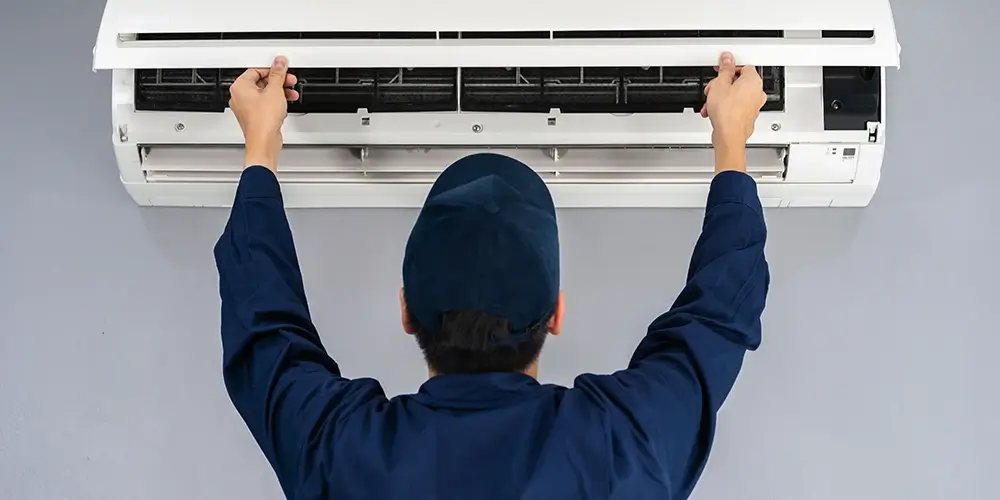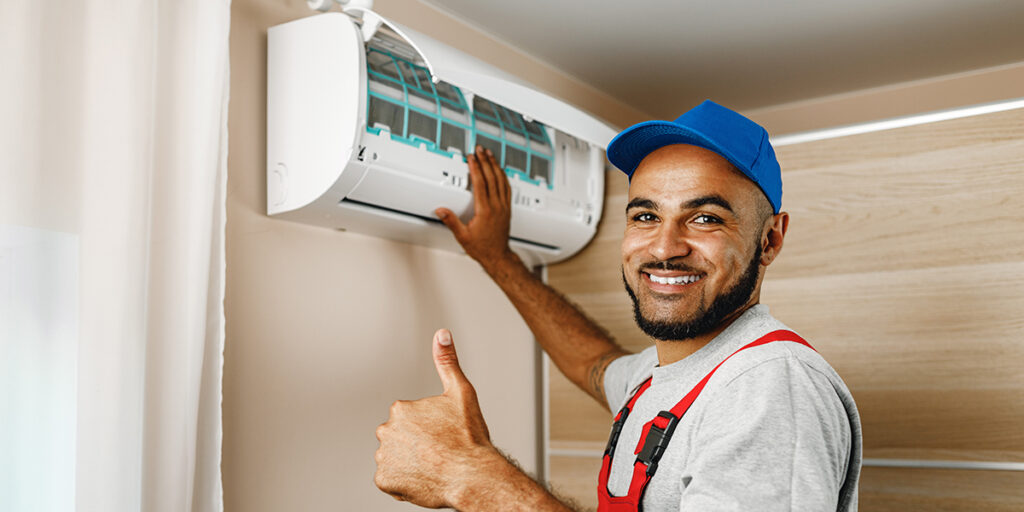Air Conditioning Repair Can Be Fun For Everyone
Air Conditioning Repair Can Be Fun For Everyone
Blog Article
3 Easy Facts About Ac Fixing Explained
AC Air Conditioner Repair: Expert Cooling System Repair Guarantees Your Home Stays Comfy Throughout The Year
Types of Air Conditioner Systems
When dealing with a/c repair work, comprehending the type of a/c system you're dealing with get more info can save time, money, and stress. Ever wondered why some units cool a space much faster than others? Or why particular systems seem to break down more frequently? Let's peel back the layers.
Central Air Conditioning
The 2-Minute Rule for Ac Fixing
Envision a cool breeze streaming through a whole home, whispering comfort into every corner. Central air conditioning systems do exactly that. They utilize a network of ducts to disperse cooled air, relying on a compressor and condenser outside, coupled with an evaporator coil inside. When this complex beast falters, identifying the problem can be like finding a needle in a haystack.
Split Systems

Split systems are a popular choice for many homes-- part indoor unit, part outdoor compressor. They offer flexibility and performance, but their double nature indicates repair can involve either element. Have you ever heard a weird noise outside your house only to discover the indoor unit isn't cooling? That's a timeless indication of a split system problem.
Air Conditioning Repair Near Me Things To Know Before You Buy
Window Units
These compact warriors fight summer heat by fitting snugly into a window frame. They combine all components into a single box. Their simpleness frequently implies less repair headaches, but overlooking filters or allowing debris accumulation can cause decreased efficiency or breakdowns.
Ductless Mini-Splits
The Best Strategy To Use For Repair Air Conditioner Near Me
Ductless systems bypass ductwork completely, making them ideal for homes without existing ventilation. They're quiet, efficient, and remarkably resilient. Yet, when repairs are needed, service technicians should be proficient at dealing with refrigerant lines and electrical connections-- no little accomplishment.
Quick Referral Table
| Type | Secret Features | Typical Repair Issues |
|---|---|---|
| Central air conditioning | Ductwork, whole-house cooling | Duct leaks, compressor failure |
| Split System | Indoor & & outside units | Refrigerant leaks, fan motor issues |
| Window Unit | All-in-one, easy setup | Filthy filters, electrical faults |
| Ductless Mini-Split | No ducts, zoned cooling | Line leaks, sensing unit breakdowns |
4 Easy Facts About Ac Repair Near Me Shown
Deciphering the A Lot Of Regular AC Issues
Have you ever questioned why your air conditioning system unexpectedly stops cooling throughout a sweltering afternoon? One common offender is an unclean or clogged air filter. This sly bad guy restricts airflow, forcing your system to work overtime, which not only decreases performance but can likewise result in early breakdowns. Envision trying to breathe through a scarf taken in dust-- it's tiring!
Another frequent misstep is refrigerant leakages. These invisible leaks do not simply decrease cooling power however can likewise harm the compressor, the heart of your air conditioner system. How typically do you inspect for uncommon hissing sounds or ice development on the coils? Catching these signs early can save you from expensive repairs down the line.
Beyond the Fundamentals: Lesser-Known Issues
4 Simple Techniques For Repair Air Conditioner Near Me
In some cases, the thermostat itself is the nuisance. Miscalibrated or defective thermostats send out combined signals, causing the air conditioning to cycle erratically. Ever skilled your air conditioning switching on and off in rapid succession? That's called short cycling, a sly efficiency drainer that can wear components much faster than you 'd anticipate.
Electrical issues, such as worn electrical wiring or a malfunctioning capacitor, may prowl underneath the surface. Air Conditioning Repair. These frequently manifest as AC systems stopping working to start or all of a sudden closing down. A professional eye knows to evaluate these components with precision tools, something a casual glimpse will not reveal
Specialist Tips for Diagnosing Common Air Conditioning Issues
More About Air Conditioning Repair Near Me
- Examine and replace air filters frequently-- every 1 to 3 months depending upon use and environment.
- Listen for unusual noises like rattling or buzzing that could indicate loose parts or electrical faults.
- Examine the outside system for particles or obstructions that hamper airflow and cause overheating.
- Look for frost buildup on evaporator coils, a hint towards refrigerant issues or air flow constraints.
- Test the thermostat settings and recalibrate if the temperature level readings feel off.
Quick Recommendation Table: Manifestation & & Probable Causes

| Symptom | Probable Cause | Expert Suggestion |
|---|---|---|
| Warm air blowing | Low refrigerant or dirty coils | Tidy coils and check for leaks right away |
| Brief biking | Thermostat concerns or large unit | Adjust thermostat settings and speak with sizing standards |
| Unit won't start | Electrical faults or capacitor failure | Test electrical wiring and change capacitors as required |
| Water leak | Clogged drain line or frozen evaporator | Clear drain lines and inspect for coil icing |
DIY A/c Upkeep Tips
The Definitive Guide to Ac Repair Near Me
Ever noticed your a/c unit sputtering like an old engine on a hot summer day? Disregarding subtle signs typically suggests more than just a sweaty afternoon-- it's a prelude to unforeseen air conditioning repair work expenses. What if you could capture those whispers before they turn into wails? Routine DIY upkeep can be your very first line of defense.
Basic Actions to Keep Your Air Conditioning Running Efficiently
How Fix Air Conditioner can Save You Time, Stress, and Money.
- Clean or Change Filters: A clogged up filter resembles attempting to breathe through a headscarf. Every 1-3 months, check and switch out your filters. It improves air flow and efficiency, avoiding compressor strain.
- Inspect the Condenser Coils: Dust and debris act as undetectable blankets smothering your unit's cooling power. Gently brush or vacuum the coils, but prevent severe chemicals that may erode the metal.
- Inspect the Drain Line: When was the last time you looked at your drain pan? A stopped up drain can trigger water leakages and foster mold growth. Flushing it with a vinegar solution month-to-month keeps the circulation clear.
- Seal and Insulate: Are your ductworks whispering leaks? Sealing gaps with mastic or foil tape enhances performance and cuts down on uneven cooling.
Pro Tips Beyond the Basics
- Measure your unit's voltage to capture subtle electrical wear before it stimulates huge issues.
- Listen for unusual hums or rattles-- these acoustic breadcrumbs often signify loose parts or failing motors.
- Keep outdoor units shaded however make sure at least 2 feet of clearance around them for optimal air flow.
Ask yourself: Are you hearing your air conditioner's quiet SOS or just waiting on it to yell? Taking some time for DIY a/c upkeep changes reactive repair into proactive care, conserving sweat, stress, and yes, money.
Our Air Conditioning Repair PDFs
Why Proficiency in Air Conditioning Repair Matters
Picture this: your air conditioning system sputters and groans during a scorching afternoon, leaving you sweltering inside your home. Would you trust a novice fumbling with fragile elements, or would you seek the reassurance of a professional air conditioner technician!.?.!? The complexities of modern air conditioning systems require accuracy and experience. A minor mistake can escalate a small malfunction into an expensive catastrophe.
Air Conditioning Repair - The Facts
Hidden Intricacies Behind the Cool Breeze
Numerous undervalue the layers hidden beneath the streamlined exterior of an a/c unit - AC Repair Near Me. From refrigerant leaks that silently drain efficiency to defective thermostats that misread temperatures, these issues require more than a basic toolkit. Specialists have an eager eye for detecting problems that balance house owners ignore
Essential Tips for Selecting the Right Service Technician
Rumored Buzz on Ac Fixing
- Accreditation and Training: Verify qualifications; a technician trained in the latest a/c innovations is vital.
- Experience with Specific Systems: Not all AC units are created equivalent; discover somebody acquainted with your design's peculiarities.
- Diagnostic Approach: Proficient specialists utilize sophisticated tools-- like electronic leakage detectors and thermal imaging-- to pinpoint covert faults.
What to Anticipate from a Pro's Diagnostic Process
| Step | Purpose | Specialist Insight |
|---|---|---|
| Visual Examination | Recognize apparent wear or damage | Search for rust or unusual noises-- an indicator often disregarded |
| Pressure Testing | Detect refrigerant leakages | Subtle pressure drops can hint at micro leaks unnoticeable to the naked eye |
| Electrical Testing | Guarantee circuit integrity | Loose connections can simulate severe mechanical failures |
How Ac Air Conditioner Repair can Save You Time, Stress, and Money.
Why Do It Yourself Often Falls Short
Appealing as it is to tinker with your air conditioning system, do it yourself fixes regularly miss the source. For example, completing refrigerant may briefly cool your area but overlooks leakages that aggravate in time. Professional service technicians do not simply patch signs; they hound the underlying mechanical and electrical faults that sap efficiency.
What Does Air Conditioning Repair Do?
Questions to Ask Before Working with
- What diagnostic tools do you utilize to identify problems?
- Can you describe the repair work process and anticipated outcomes?
- Are you knowledgeable about the refrigerants suitable with my system?
- Do you follow security protocols for handling electrical components?